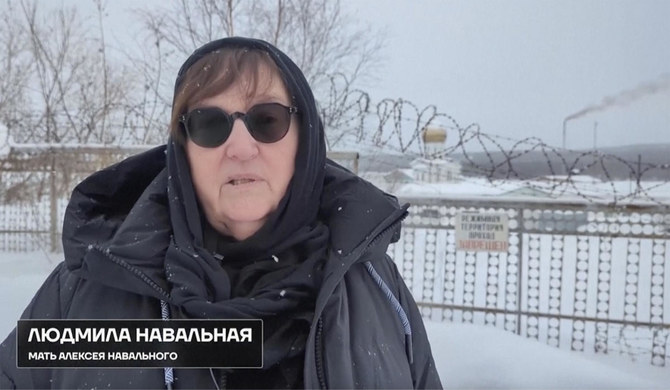WARSAW: The body of Russian opposition leader Alexei Navalny, who died unexpectedly in prison nine days ago, was handed to his mother on Saturday in the Arctic city of Salekhard, his spokeswoman said, though it was unclear what will happen next to the body.
Navalny’s family and supporters have accused Russian President Vladimir Putin of having him killed, an accusation that the Kremlin has rejected. He survived a poisoning attempt in 2020 and years of harsh treatment in prison, including long spells in solitary confinement.
Navalny’s team said on X on Thursday that his death certificate says he died of natural causes.
In a video recorded before the release of the body, Navalny’s widow Yulia Navalnaya accused “demonic” Putin of “torturing” the corpse of a political opponent.
Navalny’s allies urged supporters “not to relax” and his spokeswoman, Kira Yarmysh, wrote on X there was no certainty that Russian authorities would let relatives hold a funeral “the way the family wants and the way Alexei deserves.”
Leaders of the Group of Seven (G7) major democracies, in a statement pledging support for Ukrainian President Volodymr Zelensky on the second anniversary of the war in Ukraine, urged Russia to fully clarify the circumstances around Navalny’s death and to free “all unjustly detained prisoners.”
“We will hold those culpable for Navalny’s death accountable, including by continuing to impose restrictive measures in response to human rights violations and abuses in Russia and taking other actions,” the G7 added.
In her six-minute video published on YouTube, Navalnaya said she would continue the fight against Putin’s regime, questioned the president’s faith, and accused him of holding her husband’s body “hostage.”
On Friday Navalny’s mother Lyudmila said Russian investigators were refusing to release his body from a morgue in Salekhard until she agreed to lay him to rest without a public funeral.
She said an official had told her that she should agree to their demands, as Navalny’s body was already decomposing.
On Saturday, Navalny aides said the authorities had threatened to bury him in the remote prison colony where he died unless his family agreed to their conditions.
Since returning to the Russian presidency in 2012, Putin has positioned himself as a defender of traditional, conservative values against what he portrays as corrosive Western liberalism.
He has also trumpeted his closeness to Russia’s Orthodox Church, regularly appearing at services around religious festivals, and speaking of his personal faith.
Navalnaya said her husband had been a devout Christian who attended church and fasted for Lent even while in prison. She said his political activism had been inspired by Christian values.
Navalny’s ‘tortured’ body handed over to his mother
https://arab.news/8mdyw
Navalny’s ‘tortured’ body handed over to his mother

- Navalny’s family and supporters have accused Russian President Vladimir Putin of having him killed, an accusation that the Kremlin has rejected
- Navalny’s team said on X on Thursday that his death certificate says he died of natural causes
Dozens missing after boat carrying more than 200 migrants capsized off the coast of Gambia

- At least 102 survivors have been rescued and seven bodies recovered from the boat that capsized on New Year’s Eve in northwest Gambia’s North Bank region
BANJUL: Dozens are missing after a boat carrying more than 200 migrants on their way to Europe capsized off the coast of Gambia, the West African nation’s leader said late Friday, setting off a frantic search and rescue operation.
At least 102 survivors have been rescued and seven bodies recovered from the boat that capsized on New Year’s Eve in northwest Gambia’s North Bank region, Gambian President Adama Barrow said in a state broadcast.
The emergency services were joined by local fishermen and other volunteers in searching for the victims, days after Wednesday’s incident near the village of Jinack, he said.
Thousands of Africans desperate for better opportunities in Europe risk their lives traveling on boats along the Atlantic coast, one of the world’s deadliest migrant routes that connects the West African coast across Gambia, Senegal and Mauritania.
Many migrants seeking to reach Spain via the Canary Islands never make it due to high risks of boats capsizing. In August 2025, around 150 people were either dead or missing after their boat that came from Gambia capsized off the coast of Mauritania. A similar incident in July 2024 killed more than a dozen migrants with 150 others declared missing.
It was not clear what led to the latest tragedy. Gambia’s Ministry of Defense said the boat was found “grounded on a sandbank.”
“The national emergency response plan has been activated and the government has deployed adequate resources to intensify efforts and provide assistance to the survivors,” Barrow said.
Some of the 102 survivors were undergoing urgent medical care, the Gambian leader said.
As he condoled with families, Barrow vowed a full investigation and called the accident a “painful reminder of the dangerous and life-threatening nature of irregular migration.”
“The government will strengthen efforts to prevent irregular migration and remains determined to create safer and more dignified opportunities for young people to fulfil their dreams,” he added.














